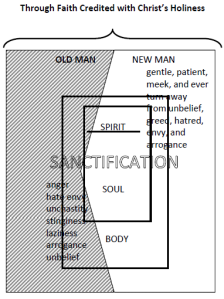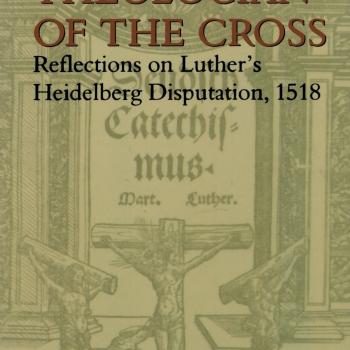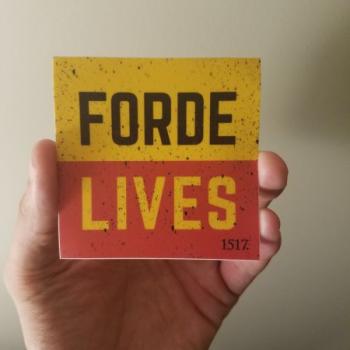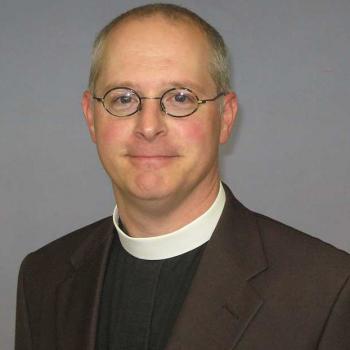
NOTE: When it comes to the best way of how to understand Christian anthropology, I do not purport to speak for any person here except for myself, even as I am confident that what I say is harmonious with FC VI.*
Following up on the heels of Trent’s fine post… (also note this relevant post from his own blog)
It is my good guess that the recent discussion that occurred at the Brothers of John the Steadfast blog about Pastor Jordan Cooper’s new book** (mentioned in the last post on my own blog) has spurred some recent posts in the Lutheran blogosphere.
On his blog, PM Notes, Pastor Matt Richards offers, in part, this quotation from the Lutheran theologian Jack Kilcrease (go here for the entire context of the quote he offers) regarding the ever-controversial “third use of the law”.
First, Kilcrease handles the first use of the law, its political use:
According to the sixth article of the Formula of Concord, the law possesses a first use: “external discipline and decency are maintained by it against wild, disobedient men.”(FC SO VI; Triglot 963) The Formula here specifically defines the first use as applying to non-Christians, or at least to false ones, through coercive authorities (parents, teachers, police, military, etc.). It is not meant to instruct or discipline Christians, but non-believers who are “wild and disobedient.”
Then, he discusses the third use (the second use is that men may be led to the knowledge of their sins):
The sixth article of the Formula also defines the third use of the law. This logically follows from the contention of both Scripture and the Lutheran Confessions that the law is God’s eternal will for human beings. Although human beings are no longer defined and determined in their relationship with God (coram deo) by the condemnation of the law, the law nevertheless still represents God’s will for human life: “For the law is a mirror in which the will of God, and what pleases Him, are exactly portrayed, and which should [therefore] be constantly held up to the believers and be diligently urged upon them without ceasing.”(FC SO VI; Triglot 963) Such a formulation provokes the question: if faith sanctifies and renews Christians, will they not automatically perform the works of the law? Yes, to the extent that they are sanctified, they will perform the works of the law, but “believers are not renewed in this life perfectly or completely.”(FC SO VI; Triglot 965) The justified sinner, therefore, is in need of the law to subdue his or her old nature. The Formula of Concord compares the old nature to “an intractable, refractory ass [that] is still a part of them [believers], which must be coerced to the obedience of Christ, not only by the teaching, admonition, force and threatening of the Law, but also oftentimes by the club of punishments and troubles, until the body of sin is entirely put off.”(FC SO VI; Triglot 969) This use of the law is no more harmless than any other use of the law. It cannot rightly be characterized as a pleasant or non-threatening form of the law.
… when the Formula of Concord posits a third use of the law, it is not… attempt[ing] to claim that the law has suddenly become friendly and nonthreatening. (Jack Kilcrease, “Gerhard’s Forde’s Doctrine of the Law: A Confessional Lutheran Critique,” Concordia Theological Quarterly Volume 75:1-2 (2011): 171-174, bold mine).
I submit that the third use of the law does not need to be controversial and Kilcrease is not necessarily right in making these conclusions. Why? Because, as Lutherans have been teaching from the beginning, the Christian is made up of two natures. Insofar as he is new in Christ, the Christian hears the law – perhaps regardless of how it is preached (i.e. with threats and punishments or as a gift of God: the beautiful expression of God’s will), and delights, in the power of Christ’s Spirit, to subdue his old Adam – either unconsciously or very consciously.

A couple things to unpack here from that statement above. All of what I say below I think goes hand in hand with that which I just re-posted at my own blog, which shows how Luther modeled the old and new man that resides in the Christian.
If the believer is subduing old Adam more or less unconsciously, this means that the believer, motivated by the Gospel in the power of the Spirit, is simply caught up in doing all manner of good, such that the desires and designs of old Adam, for the moment, almost seem to fade completely into the background. Here one might think about Luther’s famous preface to the book of Romans (none of this means of course, that our good works are not tainted by the original sin that is within us, and that Christ’s blood is not needed to cleanse them – see here for more).
And yet, sometimes the believer will need to subdue old Adam more or less consciously, simply meaning that, in that moment, the Christian is aware (I am using believer and Christian interchangeably here by the way) of not only being inspired and motivated by Christ’s gospel, but also that old Adam’s desires and designs are strong as well. In effect this means that old Adam must be told to shut up, perhaps taken for a walk, corralled, starved, tied up, chained, thrashed, etc. In short, drowned where he belongs in baptism. Here, our new nature is most cooperative with Christ – and the preacher, regardless of whether he threatens or cheerfully exhorts – in putting down the vile beast that we know will one day completely be destroyed.

(If you would like to see all of this made a bit more concrete, you can take a look at this post that I did on the matter of attending worship services: “Come to me and I will give you rest.” Law or gospel?)**
I have talked here about particular kinds of “moments” in our lives. The bigger picture is that this is a long and drawn out process (see the diagram below). The Christian life is a life-long fight,and it is the Christian who desires to participate in this fight, not the non-Christian. And insofar as we are new men in Christ, our motivation always comes from a love for God and neighbor born out of the Gospel narrowly understood (Christ’s crucified for me, freeing me from sin, death and the devil) – not out of hope for reward or fear of punishment, but rather to honor the Lord and love the neighbor.

Some give the impression that they think the “Preaching Sanctification” crowd is making Christians feel like they are outside of God’s salvation. On the contrary, like Luther did in his sermons, we are simply assuming that those who have true faith are concerned to demonstrate their faith by works – they realize faith and works go hand and hand and make their confession believable. Those who don’t have true faith don’t have this concern, even if they were at one point baptized
I suggest, in what I believe is in line with the work of Pastor Paul Strawn and Pastor Holger Sonntag, that it is because of this kind of reality above (the different desires and designs we have according to our different natures) that Martin Luther said that the Law, when applied to believers, can be “attenuated” or “domesticated”. Insofar as the believer is new in Christ, the law has [indeed] become “friendly and nonthreatening”!
Want more demonstrating this? Luther says in his Antinomian Disputations, apparently much to the consternation of many modern Lutherans (all of these are culled from here)… :
- The Holy Spirit renders the Law “enjoyable and gentle” to the justified (p. 4)
- The preacher should not make the law overly harsh among the justified but should change into the gentler tone of exhortation (p. 5, see also 17)
- “Under Christ the law is in the state of being done, not of having been done”, and therefore believers need to be “admonished by the law” (p. 5)
- Too much condemning law can lead into despair and to kill completely – the law “should be reduced through the impossible supposition to a salutary use” (pp. 8, 9)
- The law’s constant accusation against those outside of Christ is its main purpose or use (p. 14)
- To the extent that a believer is “actively” righteous, the law’s accusatory office has ceased (p. 16)
- Under the accusatory law insofar as they are sinners, Christians are also “without the law” because Christ’s fulfillment of the law is imputed to them and insofar as they battle sin in their lives in the power of the Holy Spirit (pp. 16-17)
- We obey more willingly and freely when Christ’s life is shown as the example of the law (p. 17)
- Our “active justification” in the world, while imperfect, is still praiseworthy (pp. 23, 24)
- God needs our good works because He is pleased to need them according to His will (pp. 25, 26)
- Luther’s anthropology of the “Thomas Christian”, where we are a twin that is triumphant and militant at the same time, explains how we are called into “lifelong military service and battle array” to expel sin against God’s law in them more and more (pp. 27, 28 ; note this is not the sinner/saint distinction)
- Venial sins are done against the renewed will of the Christian, while mortal sins are done with the full consent and pleasure of those who either never had or who have now lost Spirit, faith, and therefore also their renewed heart (p. 29, 30)

So, as Pastor Holger Sonntag says, when it comes to preaching, Luther says that “this method” is that of “Christ himself, John the Baptist, the apostles and prophets.” (see here for more).****
FIN
Notes:
*Perhaps this view of Christian anthropology is not the best overall way to put or look at things, but again, I do not believe that there is anything false in what I am saying.
**The debate is pretty lengthy. For three very helpful comments that will help you digest the gist of it quickly, see these first two comments from Pastor Sonntag:
http://steadfastlutherans.org/?p=38683&cpage=5#comment-1033941
http://steadfastlutherans.org/?p=38683&cpage=5#comment-1034100
..and, I think, one of Pastor Cooper’s most important remarks… Pay close attention to this – particularly what he says about how he became a Lutheran and the confusion he experienced – and ponder what this might mean.
http://steadfastlutherans.org/?p=38683&cpage=5#comment-1033889
***A short clip from my post about Pastor Paul Strawn’s paper, mentioned above:
“Strawn quotes Luther in his second Galatians commentary saying that “there is great comfort for the faithful in this teaching of Paul’s [about the dual nature of the Christian] … if we sometimes become aware of the evil of our nature and our flesh…we are aroused and stirred up to have faith and to call upon Christ…” (p. 12) “Mindful of our illness”, the Christian constantly and consciously hears and meditates on the word of God, prays, and uses the sacraments to be “purged” and “cleansed of the poison of sin” – until our deaths when we are entirely purged. We also use rituals and works “like an orderly of sorts” so that our sinful nature can be restrained while we “endur[e] the cure of a living physician, that is Christ.” (p. 13).”
****For more good stuff, read this paper by Pastor Mark Surburg as well. Again, see this from Trent’s own blog as well.











